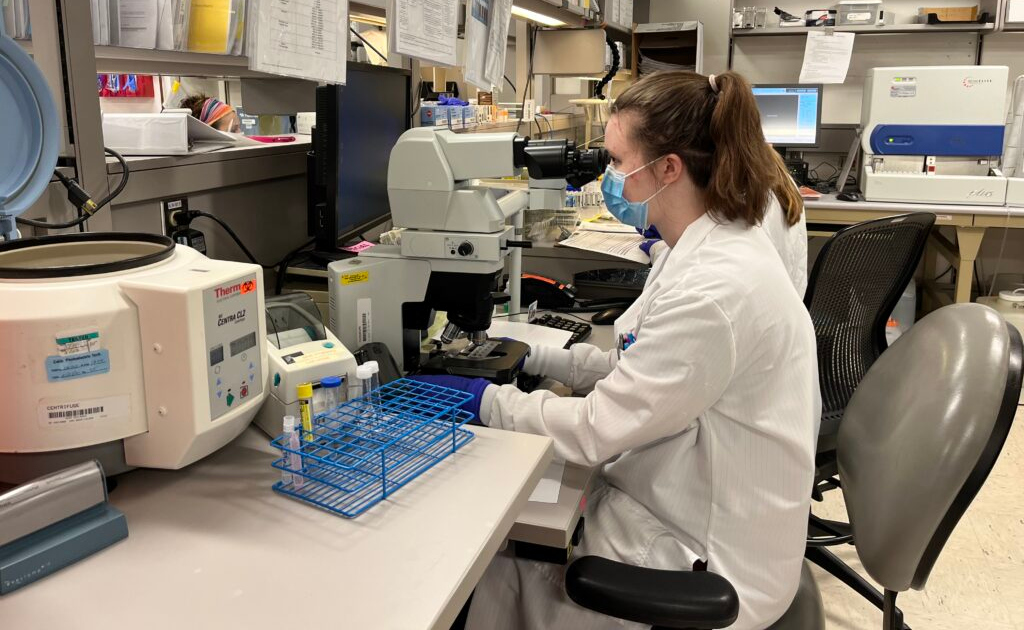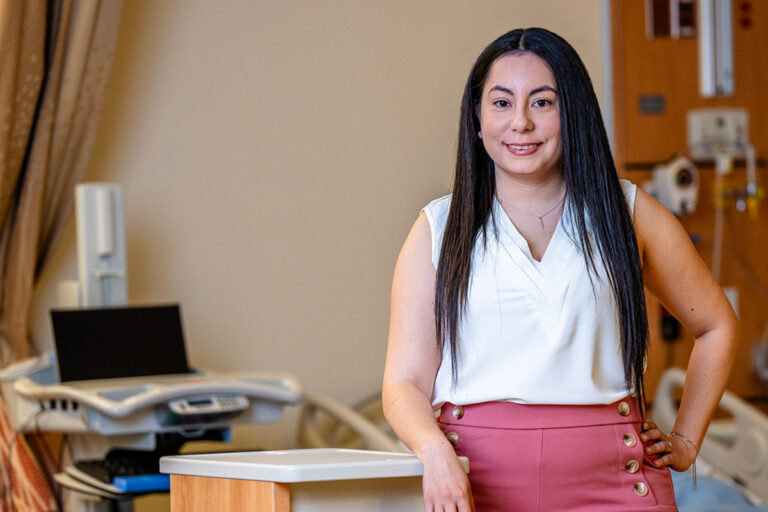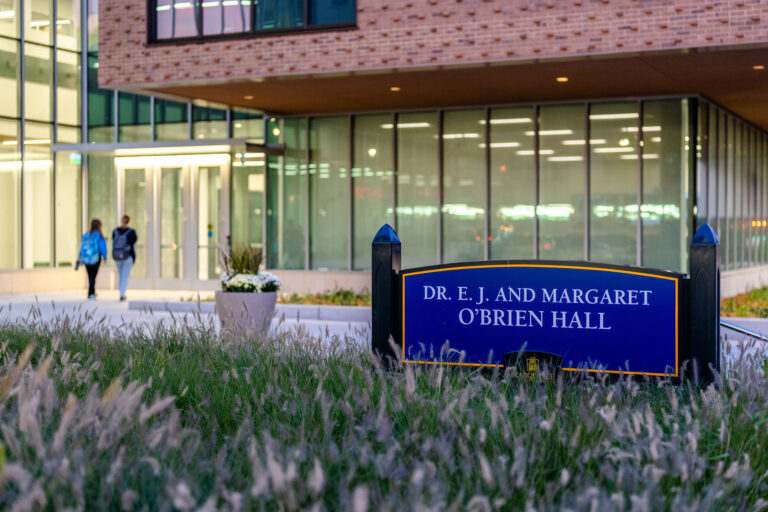By Alex Nemec, marketing communication specialist
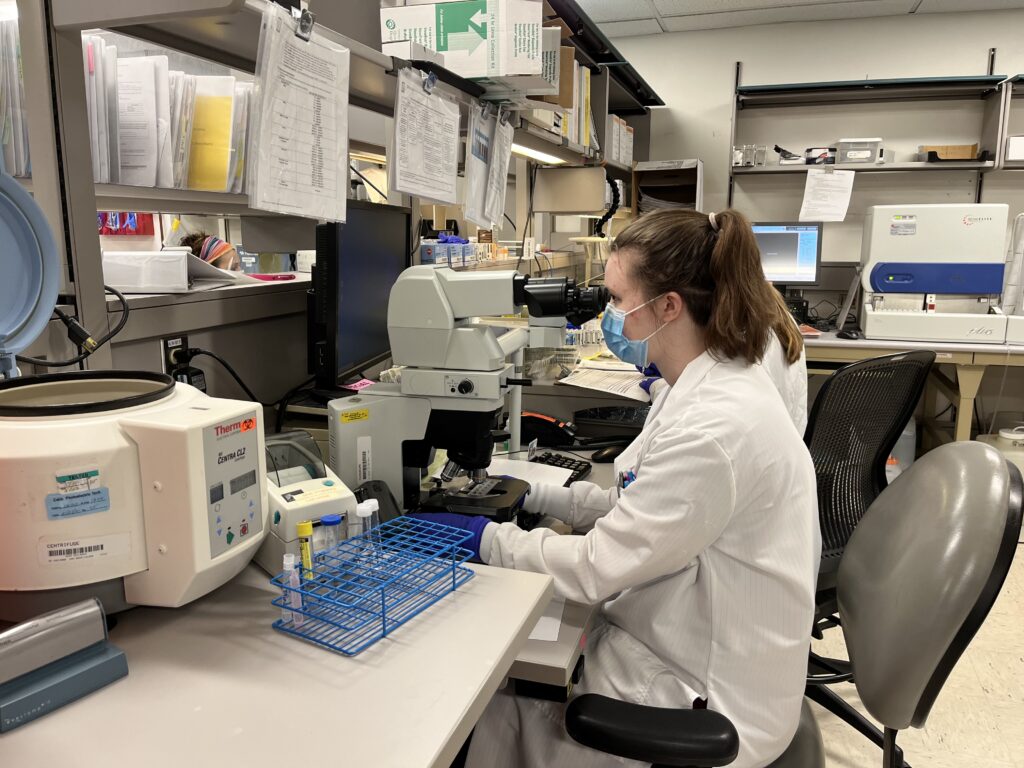
Dr. Valerie Everard-Gigot describes diagnosing medical patients as a puzzle – a critical puzzle requiring confident accuracy.
“Our students learn how to ensure that the final piece of the puzzle fits perfectly,” says the chair of the Medical Laboratory Sciences Department regarding the tests run on patient specimens.
From blood banking and hematology to toxicology and microbiology and more, medical laboratory science plays a crucial part in health care. The scientists assure the accuracy and fidelity of critical laboratory tests and do so by mastering extremely technical scientific diagnostic instruments for optimal sensitivity and specificity. This commitment to accuracy prevents errors that could be incredibly harmful to human health.
Marquette University’s Medical Laboratory Science program is modest — about 38 students and three professors — but poised to grow in line with the heightened demand for more laboratory scientists. Not only is the industry growing, but the nature of the science itself is always changing, bringing an exciting and fascinating element to the expertise.
Prior to teaching at Marquette, Associate Professor Dr. Erik Munson worked as a lab director for 15 years at the former Wheaton Franciscan Laboratory in Milwaukee.
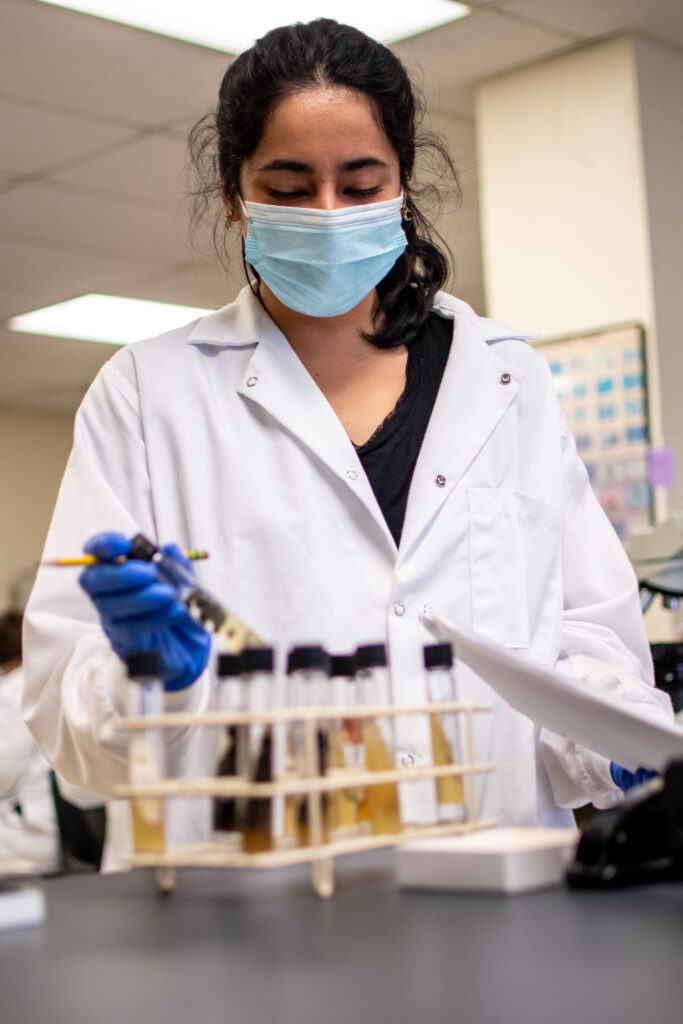
“The most fun part of my job is we never got the same thing every day. There was always something different that came up,” Munson said. “Those new obstacles test your ability to adapt to a situation or, frankly, gives you something new to learn.
“That’s probably the best thing about the new challenges. Bacteria and pathogens change all the time. It gives you tremendous opportunities to learn even while you’re working.”
Given the size of the program, students and professors in the Medical Laboratory Science program build strong relationships that allow students to thrive in their studies and in their careers.
Student Maia Villaflor emphasized how important those relationships have been to her success as a student.
“Whether it’s in class or outside of class, the professors in the program never hesitated to offer one-on-one help to ensure my success,” Villaflor said. “Between study tips and helpful lessons in lab, they’ve been there for me.”
‘Right in the middle of the action’
Everard-Gigot says she thinks the student that wants to be in this program is one that wants a direct role in patient diagnosis.
“They’re right in the middle of the action,” she says.
For example, the infamous cryptosporidium outbreak in Milwaukee in 1993 was discovered by Milwaukee City Laboratory Director Steve Gradus.
“The laboratory is an essential component in not just hospital treatment of patients, but it plays a role in public health too,” Munson says.
Morgan Hays, who graduated in the spring of 2020, transferred into the program when she realized she wanted a job in health care that was more patient centric. She says medical laboratory science opened the right doors.
“It was a broad enough field that I could figure out what I wanted to do but still graduate and have plenty of job opportunities before I graduated,” Hays says.
Brittany Cassel, a 2019 biomedical sciences alumna who returned to Marquette to earn a Medical Laboratory Science post-graduate certificate, says she always knew she wanted to work in health care.
While exploring jobs, Cassel says she found a job opening for a laboratory scientist and became enamored with the program after learning more about it and the endless learning opportunities.
“It’s never boring,” Cassel says. “There’s always something, some atypical test that a physician orders, and it’s fascinating to learn about.”
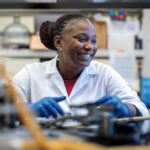
Guaranteed, local internships
What makes Marquette’s Medical Laboratory Science program stand out from other programs in the region is the guaranteed internship offered during the student’s senior year.
“At a bigger program, students would have to interview for one spot out of many candidates,” Everard-Gigot says. “Those interviews could primarily be based on GPA, and other students might have to travel out of state to get a clinical spot. All of our internships are in the Milwaukee area.”
Villaflor says knowing she has a guaranteed internship lifts the stress of finding one and allows her to better focus on her studies.
“Having guaranteed placement at a clinical site is helpful since a majority of students get a job offering during their clinical rotations,” she says. “It takes away a lot of the stress and worry I feel about what I’m going to do after I graduate, allowing me to enjoy college and my classes a lot more.”
Zapp says the guaranteed internship gives her something to look forward to.
“I view it as a way to take everything I have learned in my studies and show myself how far I have come and get an opportunity to apply my skills in a clinical setting,” Zapp says. “I feel more inspired to focus on my current classes, so I get to perform at my best once I reach that internship.”
Standing out for med school and career opportunities
Marquette’s Medical Laboratory Science program provides excellent skills for a health care student’s education, Everard-Gigot says.
“Through lab work, a guaranteed clinical placement and general excitement finding an answer, students are driven to think outside of box and achieve a diagnosis by thinking critically,” Everard-Gigot said. “There are a lot of factors in play when a student applies to a graduate program, but the skills learned in our program put the student in a great place to succeed.”
“If you want to stand out for medical school or any other post-grad education, why wouldn’t you do this?” she says. “Our students have a different perspective outside of a textbook of how patient diagnosis is carried out.”
Hays, who currently works in North Carolina, says the best practices she learned at Marquette has set her apart from coworkers at various jobs — she is ready for all the curveballs the job throws at her.
“Marquette did such a good job of teaching us how to problem solve issues,” Hays says. “Thanks to what I learned at Marquette, I know how to approach the problem and not get flustered about it. They gave us the tools to be successful.”
Learn more about Marquette University’s Medical Lab Science program.
